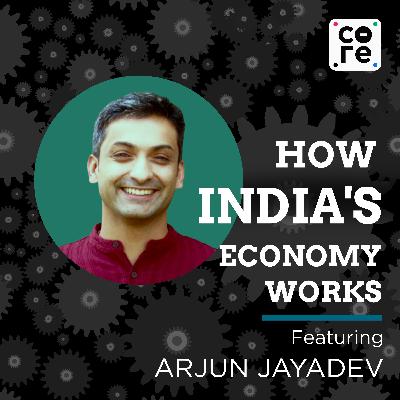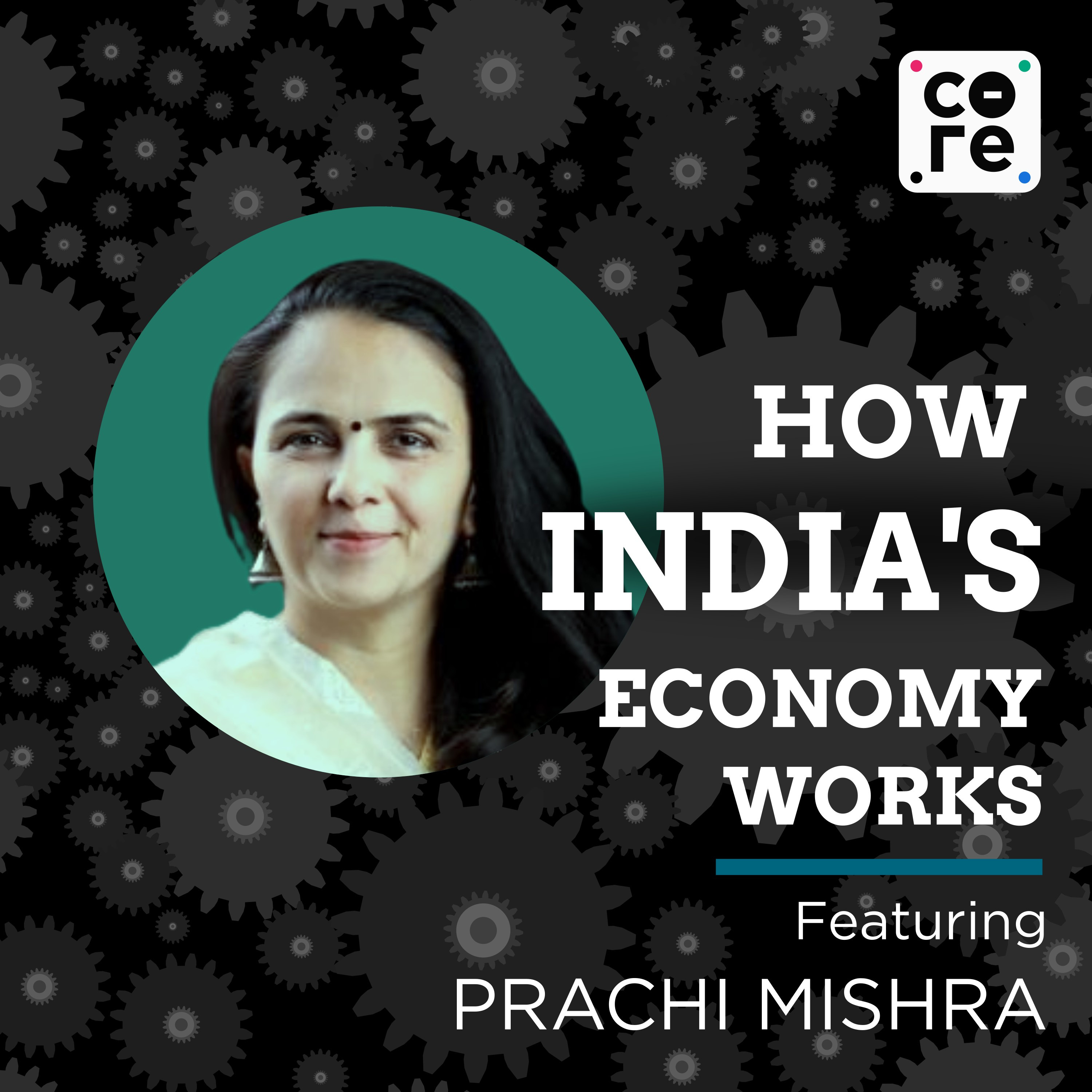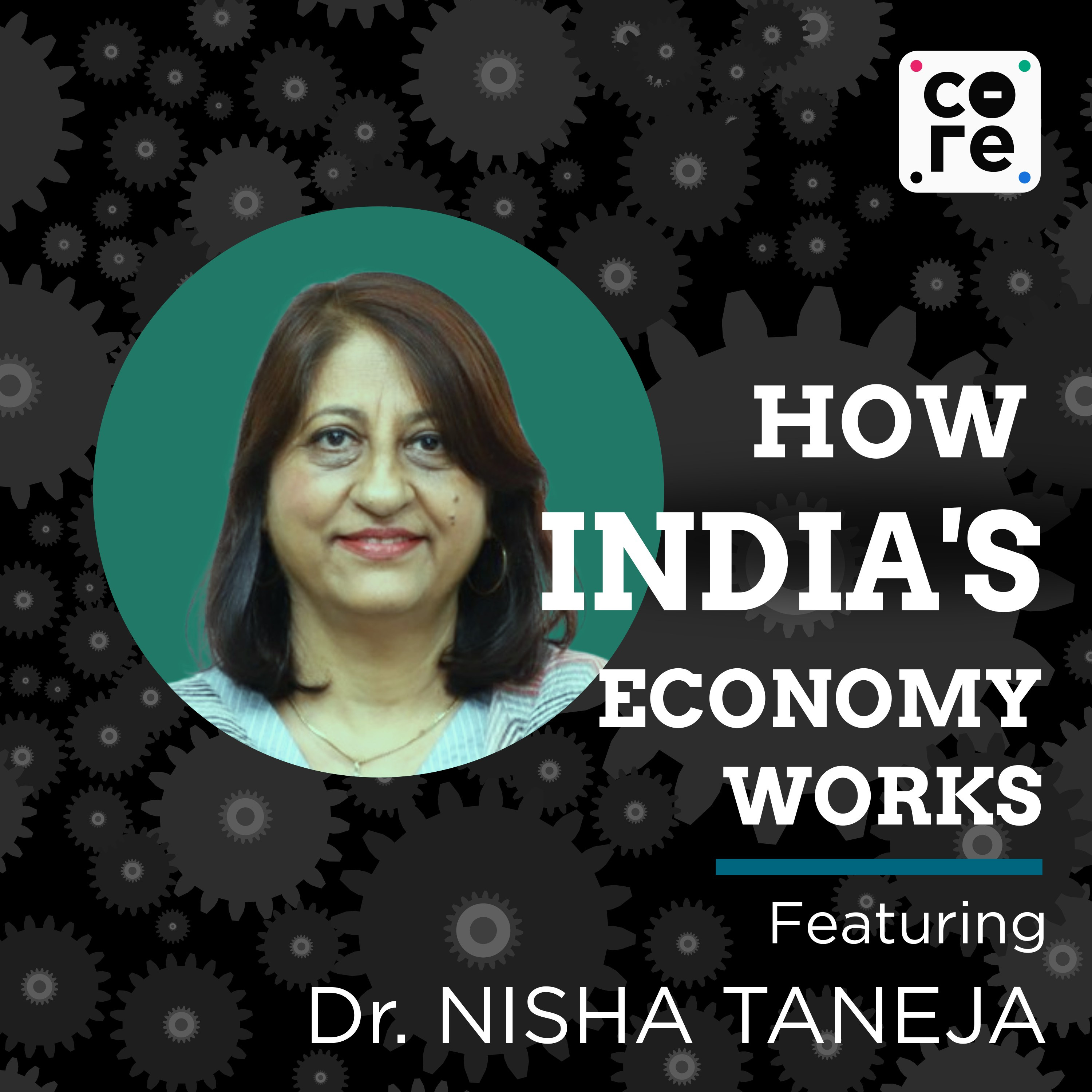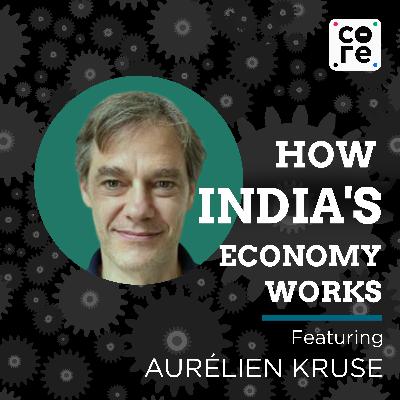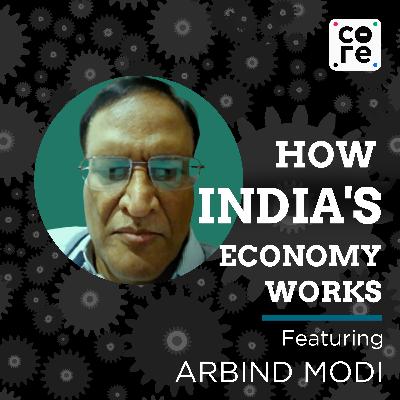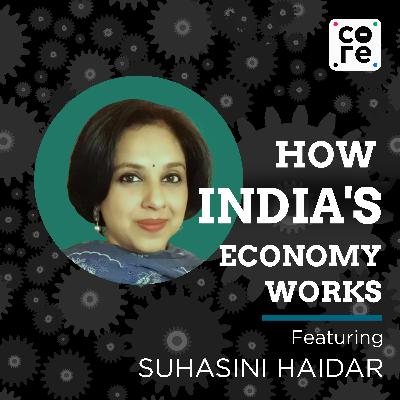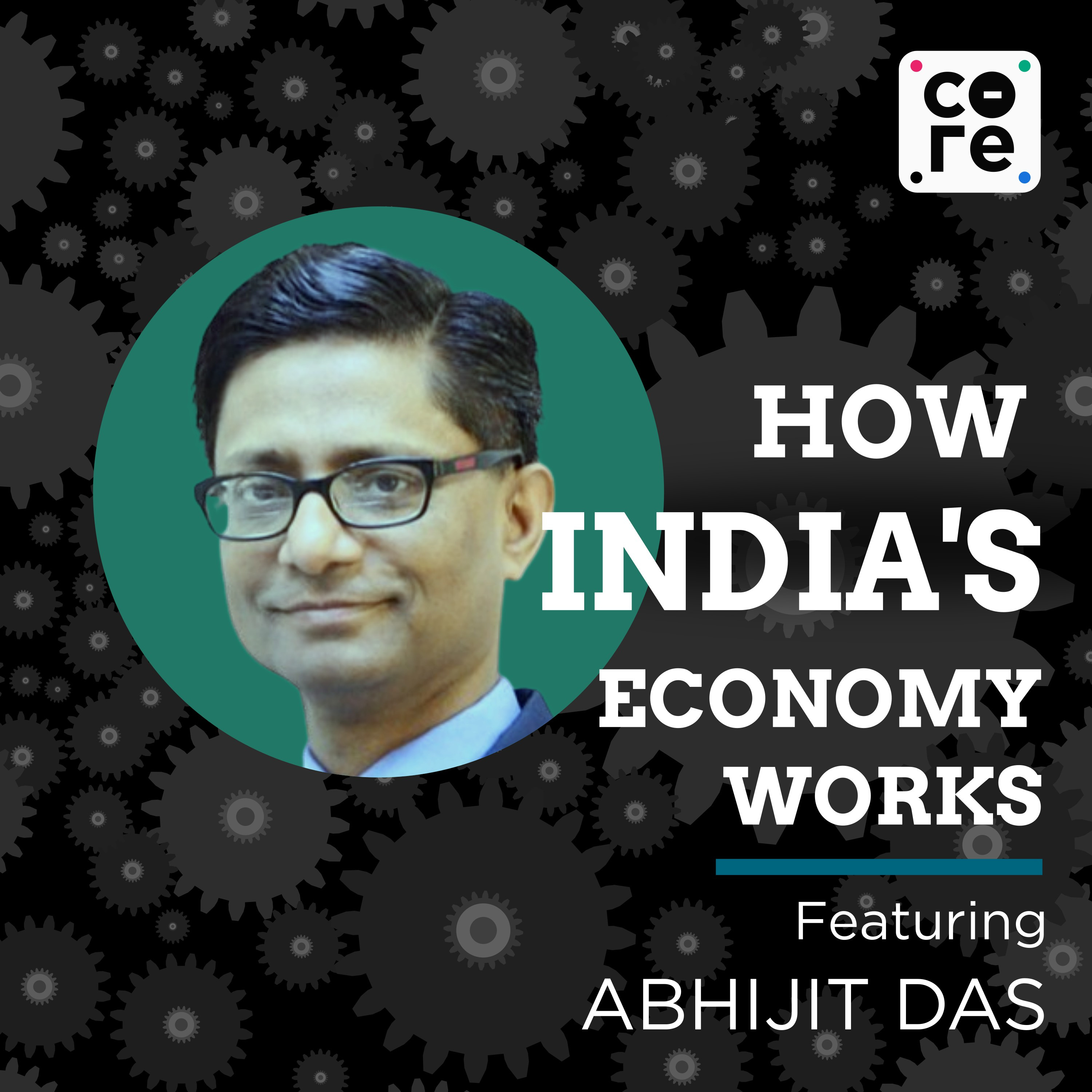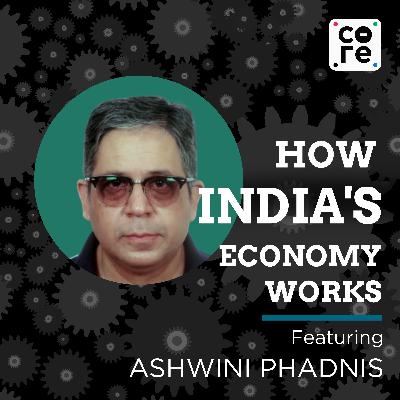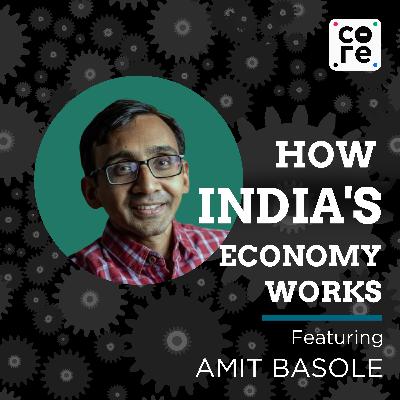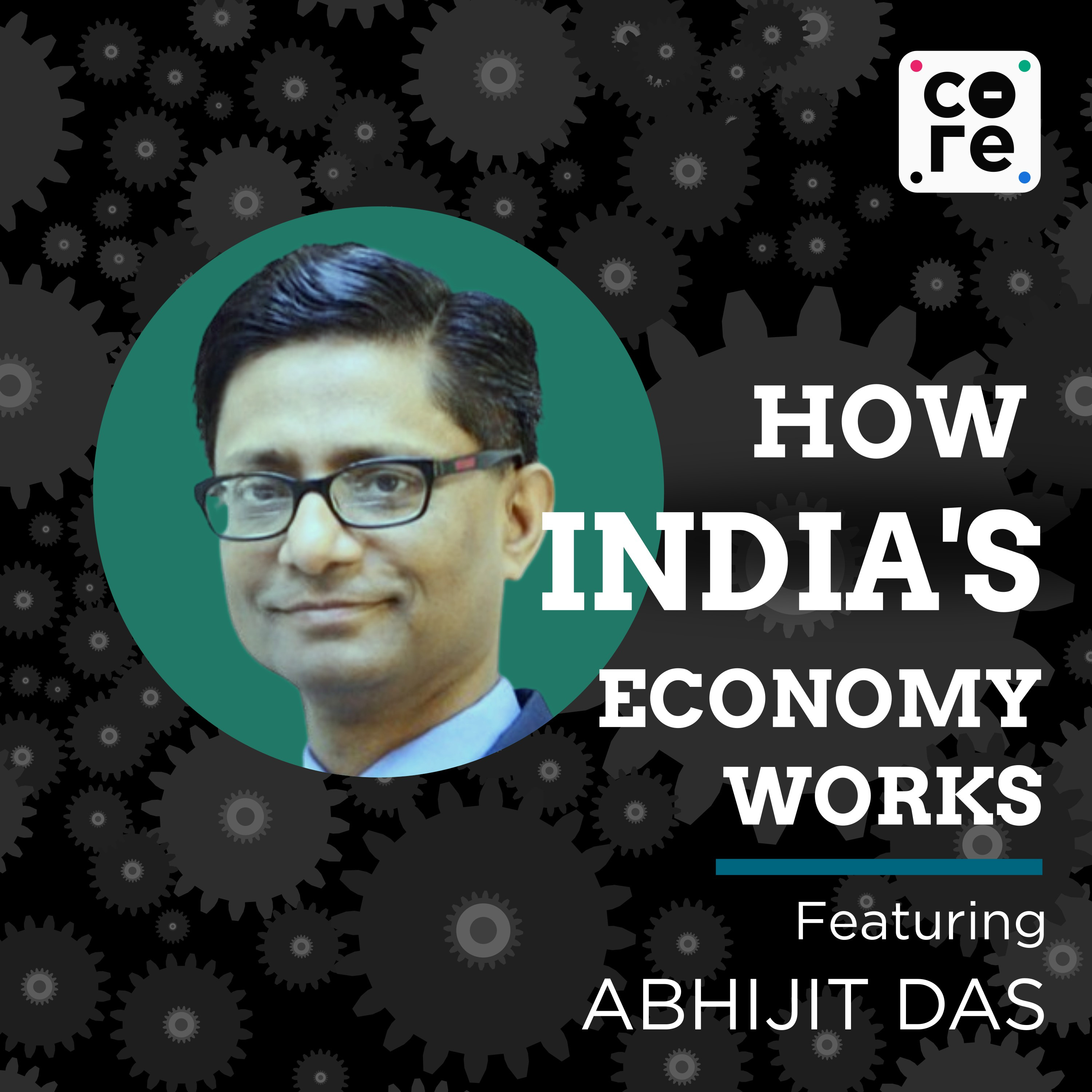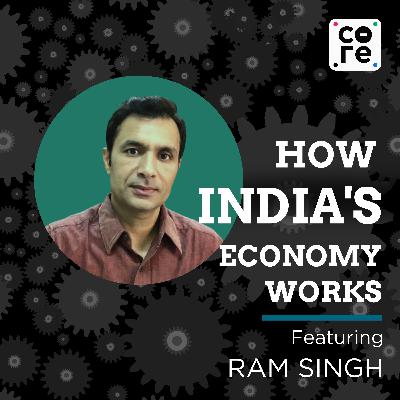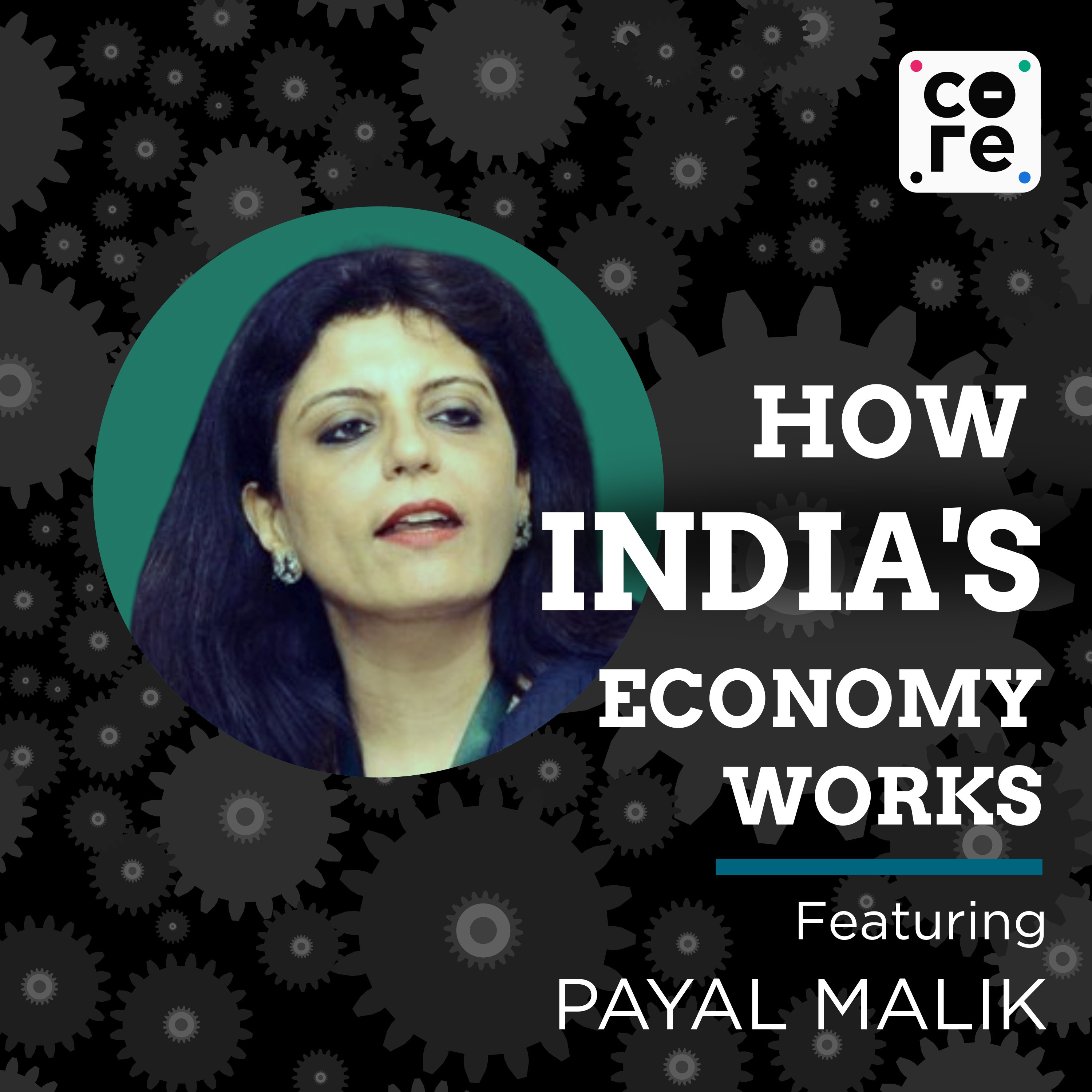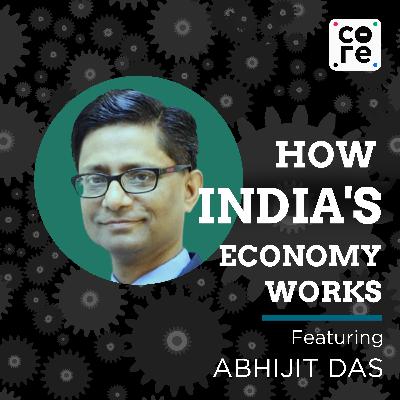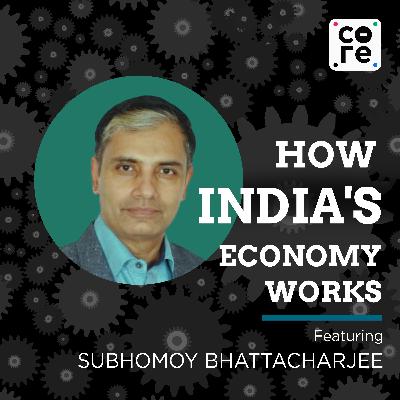Discover How India's Economy Works
How India's Economy Works

46 Episodes
Reverse
In this episode, journalist and author Puja Mehra speaks with economist Arjun Jayadev, Director at the Centre for the Study of the Indian Economy (CSIE) at Azim Premji University and co-author of a major new study on how India’s demographic dividend has actually contributed to economic growth across states. Jayadev explains why India’s per-capita growth has diverged sharply across regions, how GDP per capita can be decomposed into productivity, employment, and demographic effects, and what this reveals about the three distinct phases of India’s post-liberalisation growth story. He outlines why the 2004–2017 period saw East Asian–level productivity surges in states such as Tamil Nadu, Gujarat and Karnataka, why employment ratios simultaneously collapsed, and how the years since 2017 have been defined by a worrying fall in labour productivity despite a rise in employment.Jayadev also highlights the structural risks ahead: young states like Bihar and Uttar Pradesh that are unable to generate high-productivity jobs; ageing states like Kerala and Himachal Pradesh that are losing demographic tailwinds; and the national challenge of absorbing millions into productive work before the demographic dividend fully fades. Drawing on granular state-level data and labour force trends, he argues that India is at risk of “growing old before it grows rich,” and that the next decade must focus on expanding high-productivity employment, enabling migration, and designing state-specific strategies rather than uniform national prescriptions. Tune in for insights on what India must prioritise now to convert its demographic window into sustained and inclusive economic growth.(00:00) Introduction(00:14) What the demographic dividend really means(01:36) How the study decomposes GDP per capita(01:58) The three components of growth explained(05:55) Why early job absorption lagged(07:14) Phase 2 (2004–2017): jobless growth and soaring productivity(10:47) Phase 3 (post-2017): collapsing labour productivity(11:02) Rise of low-productivity, agriculture-heavy employment(12:21) What the findings mean for policymakers(13:55) Young vs ageing states: diverging economic futures(15:38) India vs Japan: productivity and demographics(17:26) East Asian–level productivity in Indian states(19:52) What states must do now to create productive jobs(22:04) How India squandered its demographic dividend(23:22) Why lagging states must urgently generate high-productivity work(24:01) The warning signs aheadFor more of our coverage check out thecore.inSubscribe to our NewsletterFollow us on:Twitter |Instagram |Facebook |Linkedin |Youtube
In this episode, journalist and author Puja Mehra speaks with economist Prachi Mishra, Professor at the Department of Economics, and Director and Head of Isaac Center for Public Policy at Ashoka University and lead author of a forthcoming report on how the Bihar can accelerate its path to Viksit Bihar. Mishra explains why Bihar must aim for sustained double-digit growth to close its large per-capita income gap with the rest of India, and why doing so requires more than traditional agriculture or services-led expansion. She outlines how Bihar can unlock growth by pursuing targeted agro-industrialisation around crops such as maize, makhana and litchi, scaling tourism through distributed cultural circuits and diaspora engagement, developing GCC and special economic and logistics zones, and improving the quality and allocation of public capital spending. Mishra also highlights the need for stronger state capacity — from law and order to skilling and logistics — better revenue mobilisation including property taxes, and clearer fiscal rules to balance transfers and investment. Drawing on empirical analysis and a granular, district-level roadmap, she argues that Bihar’s greatest opportunity lies in strategic industrial policy that links geography, value addition and employment. Tune in for insights on what the new government must prioritise to turn Bihar’s potential into sustained prosperity.For more of our coverage check out thecore.inSubscribe to our NewsletterFollow us on:Twitter |Instagram |Facebook |Linkedin |Youtube
In this episode, journalist and author Puja Mehra speaks with economist Dr. Nisha Taneja, Professor at ICRIER and author of a comprehensive study on India–China trade, about how India can recalibrate its economic relationship with China. Taneja explains why India’s imports from China continue to rise despite policy tightening and geopolitical tensions, and why efforts to restrict trade have not reduced dependence. She outlines how India can expand its export base by targeting a $161 billion opportunity in pharmaceuticals, machinery, shrimp, gems, and tourism, while building competitiveness in medium and high-tech sectors. Taneja also highlights the need for a clearer institutional framework to separate politics from trade, encourage investment in manufacturing, and deepen business-to-business dialogue. Drawing on decades of research, she argues that India’s real leverage lies in its human capital and its ability to diversify. Tune in for insights on how India can seize an opportunity with China that it has too long overlooked.RESOURCE LINKShttps://icrier.org/pdf/Calibrating_India_s_Economic.pdf For more of our coverage check out thecore.inSubscribe to our NewsletterFollow us on:Twitter |Instagram |Facebook |Linkedin |Youtube
In this episode, Puja Mehra speaks with economist Dr. Anoop Singh, author of Managing Public Finances in a New Global Era: India’s Experiences and Challenges, about how India can strengthen fiscal discipline in an age of slowing trade and rising public debt. Singh explains why the world is shifting from trade-driven to fiscal-driven growth and how India must confront the challenges of opaque accounting, off-budget borrowing, and mounting subsidies. He highlights the urgent need for common definitions across states, transparent reporting, and institutional reform to ensure that every rupee spent is visible and accountable. Drawing on lessons from global peers, Singh argues that sustainable growth depends on seeing and managing what governments spend. “You cannot manage what you can’t see,” he warns. Tune in for insights on how India can build a more transparent and resilient fiscal framework for the years ahead.PDF - The State of State Finances in India: Bridging the Data Gaps: https://www.thecore.in/h-library/is-3aanoops.pdf For more of our coverage check out thecore.inSubscribe to our NewsletterFollow us on:Twitter |Instagram |Facebook |Linkedin |Youtube
In this episode, Puja Mehra speaks with economist Dr. Rajat Kathuria about the evolving landscape of India-US trade relations and the broader challenges of global economic engagement. Kathuria explains how India must balance political sensitivities in sectors like agriculture while ensuring competitive access to the US market. He highlights the importance of tariff reductions, strategic concessions, and diversification in trade and energy imports to attract investment and strengthen economic resilience. The discussion also delves into the role of media in shaping economic narratives and the lessons India can learn from China’s measured rise. Kathuria emphasizes India’s intrinsic entrepreneurial talent, frugal innovation, and the need to engage in global trade frameworks like CPTPP and RCEP. Tune in for insights on how India can leverage its strengths to become a leading global economic power.(00:00) Introduction(01:15) The Politics Behind India–US Trade Relations(04:40) Why Agriculture Is Always a Sticking Point(08:05) The Role of Tariffs and Market Access(11:20) What India Can Offer the United States(14:35) Mini Deals vs. Comprehensive Trade Agreements(17:10) How Global Trust Has Broken Down Since the Pandemic(20:25) India’s Strategy for Building Economic Resilience(23:45) The Importance of Diversifying Energy and Trade Partners(26:30) Media Narratives and Policy Misunderstandings(29:10) Learning from China’s Measured Global Strategy(31:45) Redefining India’s Red Lines in Trade Negotiations(33:00) Why Rajat Kathuria Remains Optimistic About India’s Future(34:56) ConclusionFor more of our coverage check out thecore.inSubscribe to our NewsletterFollow us on:Twitter |Instagram |Facebook |Linkedin |Youtube
In this episode, economic journalist and author Puja Mehra speaks to Aurélien Kruse, Lead Economist of the Economic Policy team in India at the World Bank and lead author of its recent report on India. The conversation unpacks how India can break out of the middle-income trap, why small firms struggle to scale up, and what stalled reforms on land, labour, and credit mean for the country’s competitiveness.They also discuss whether India’s large domestic market is enough to drive growth, the limits of tariff-led industrial policy, and why inclusive development—not just fiscal incentives—will ultimately determine the size of India’s consumer class and its ability to attract sustained private capital.Tune in for insights on what it will take to reignite private investment, implement reforms that actually deliver, and unlock India’s long-awaited growth potential. This episode offers both a reality check on India’s reform story and a roadmap for policymakers to create a more predictable, investment-friendly future.For more of our coverage check out thecore.inSubscribe to our NewsletterFollow us on:Twitter |Instagram |Facebook |Linkedin |Youtube
In this episode, economic journalist and author Puja Mehra speaks to Arbind Modi, retired IRS officer and Senior Economist at the IMF and one of the chief architects of India’s Goods and Services Tax (GST), about what India’s broken tax system means for its growth ambitions. The conversation explores how GST’s design flaws have hurt competitiveness, why exempting large sections of income undermines fairness, and how Centre–State revenue sharing has created new fiscal strains.The discussion connects India’s tax choices to global shifts, from the Trump-era trade wars to the reordering of supply chains, making clear that without serious reform, India risks missing yet another growth opportunity.Tune in for insights on what it will take to reset India’s tax system, revive competitiveness, and lay the foundation for sustained 8% growth. This episode is both a masterclass in India’s tax system and a call for bold, evidence-driven policymaking.(00:00) Introduction(02:15) Why GST Hasn’t Delivered on Its Promise(07:42) Fixing GST Design and Efficiency(12:30) The Problem with GST Rates and Complexity(16:58) Corporate Tax Cuts and Their Consequences(21:47) Why Income Tax Exemptions Are a Mistake(27:15) The Centre–State Revenue Sharing Dilemma(32:44) The Case for Comprehensive Tax Reform(38:52) How GST Reform Could Unlock Higher Growth(46:10) Why Political Will Matters More Than Bureaucratic Hesitation(51:21) Decluttering GST and Fixing Excise Duties(55:23) Why Taxing Gold Jewellery Hurts the Poor(59:26) ConclusionFor more of our coverage check out thecore.inSubscribe to our NewsletterFollow us on:Twitter |Instagram |Facebook |Linkedin |Youtube
In this episode, journalist Puja Mehra speaks to Suhasini Haidar, Diplomatic Affairs Editor of The Hindu, about what India’s failed trade deal with Donald Trump reveals about the country’s foreign policy. The discussion unpacks how India balances principles with pragmatism in global negotiations, the costs of missed opportunities in its own neighbourhood, and the deeper shifts from globalisation to populism that are reshaping trade worldwide. Suhasini also explains why India’s diplomatic space depends not only on economic choices but also on the strength of its democratic and pluralistic values.Tune in for insights on how India can navigate uncertainty, define its red lines, and reset its strategy for the future.For more of our coverage check out thecore.inSubscribe to our NewsletterFollow us on:Twitter |Instagram |Facebook |Linkedin |Youtube
In this episode, author and journalist Puja Mehra speaks to Neelkanth Mishra, Chief Economist at Axis Bank, about the lessons India can draw from past currency wars to navigate the turbulent years ahead. They discuss how, in the decade after the collapse of the Bretton Woods system, countries devalued their currencies to gain trade advantages—and how similar pressures are resurfacing today as major economies look to depreciate their exchange rates. Drawing on global historical patterns, Mishra explains why India’s medium-term balance of payments outlook is relatively stable, but also why access to foreign capital and careful currency calibration will be crucial for sustaining growth.He argues that the current period of global economic flux is a rare opportunity for India to take difficult but necessary reform decisions—removing barriers for entrepreneurs and farmers, improving access to technology, and building resilience against a more protectionist world order. Without such reforms, sustaining current growth rates could become a challenge.Tune in for insights on how India can use a moment of global turbulence to drive structural change, sustain economic momentum, and emerge stronger in an era of competitive currency moves.For more of our coverage check out thecore.inSubscribe to our NewsletterFollow us on:Twitter |Instagram |Facebook |Linkedin |Youtube
In this episode, author and journalist Puja Mehra speaks to economist Dr. Rajiv Kumar about his new book “Everything All At Once: India and the Six Simultaneous Global Transitions” co-authored with Ishan Joshi. The book argues that at a time the world is in a geoeconomic and technological flux, India’s development goals cannot be met through “business as usual.” Drawing on decades of experience, Dr. Kumar explains that India is perhaps the only country in world history that must develop while reducing its carbon footprint at the same time. This too at a time the US is abandoning its universalist approach, China is rising, and there is a widespread sense of unease in major capitals at the emergent fragmented world order. The sense of optimism at the end of the Cold War, despite lingering issues of power asymmetry and inequitable growth, has dissipated. Dr. Kumar argues that Indian policymakers must ensure they are not seduced into tackling the ongoing transitions in either a piecemeal fashion or within a linear framework. The six global transitions demand a rethink of policy priorities. In the absence of such a construct, India faces the unsavoury prospect of being caught in the middle-income trap, and not achieving its aspirations of becoming a developed economy (Viksit Bharat) by 2047, he cautions. Tune in for insights on how India needs to go about developing a new policy framework to successfully address the multiple simultaneous global challenges.For more of our coverage check out thecore.inSubscribe to our NewsletterFollow us on:Twitter |Instagram |Facebook |Linkedin |Youtube
In this episode, author and journalist Puja Mehra speaks to trade policy expert Prof. Abhijit Das about the India-UK Free Trade Agreement (FTA) that was signed on 24th July 2025 after years of negotiation. Hailed as a major breakthrough, the agreement promises tariff-free access for Indian exports like textiles, leather, and marine products, along with visa commitments for service professionals. But what lies beneath the surface?Prof. Das explains why, despite the initial excitement, the fine print raises concerns—ranging from stringent UK standards in agriculture and environment to new subsidy notification obligations and a surprising shift in India’s position on compulsory licensing for medicines. He unpacks what India has agreed to in areas like Intellectual Property Rights, labour, and gender, and whether these concessions could come at the cost of future policy flexibility.Tune in for insights and analysis of what this FTA really means for India’s exporters, its negotiating strategy, and its ability to shape trade policy in the years ahead.For more of our coverage check out thecore.inSubscribe to our NewsletterFollow us on:Twitter |Instagram |Facebook |Linkedin |Youtube
In this episode, author and journalist Puja Mehra speaks to trade policy expert Prof. Abhijit Das about the status of India’s trade negotiations with the United States under the Trump administration. While President Trump had promised 90 trade deals in 90 days, only two have materialised—one with the UK and another with Vietnam—and even those remain light on details. Meanwhile, Indian negotiators are in Washington for another round of talks, and expectations are high. Prof. Das explains what India is hoping to achieve, what makes these negotiations so complex, and why trade agreements with the US are rarely straightforward. He breaks down the behind-the-scenes dynamics, sticking points, and broader implications for India’s exporters and policy framework. Tune in for insights on what’s really going on in the room where the deals (or no-deals) happen.For more of our coverage check out thecore.inSubscribe to our NewsletterFollow us on:Twitter |Instagram |Facebook |Linkedin |Youtube
In this episode, author and journalist Puja Mehra speaks to senior aviation journalist Ashwini Phadnis and former Senior Deputy Editor at Business Line (aka The Hindu Business Line) about the long and chequered history of India’s civil aviation sector—from the post-Independence days of Air India under JRD Tata to the airline’s recent crash under Tata Group ownership. They trace how government policy, corporate decision-making, and regulatory uncertainty shaped the rise and fall of airlines like Jet Airways, Kingfisher, Air Deccan and Air Sahara. Ashwini draws on decades of reporting to unpack the behind-the-scenes politics, failed mergers, and missed opportunities that brought down some of India’s best-loved carriers. He also reflects on what made Indigo a standout success—and what Air India must fix if it is to rebuild trust. Tune in for insights into Indian aviation, past and present.
In this episode, author and journalist Puja Mehra speaks to Amit Basole, Professor of Economics and Head, Centre for Sustainable Employment and the lead author of the State of Working India report. They talk about why India’s unemployment challenge remains unresolved, why fixing the employment crisis goes beyond grand economic reforms, touching on issues like local governance, municipal underfunding, and the lack of coordination between ministries and levels of government. They also delve into what India’s demographic trends imply for the future, and whether the country risks “growing old before growing rich.” Tune in for insights into one of India's most urgent and complex economic problems.For more of our coverage check outthecore.inSubscribe to our NewsletterFollow us on:Twitter |Instagram |Facebook |Linkedin |Youtube
In this episode, author and journalist Puja Mehra speaks to trade policy expert Abhijit Das about what’s at stake for India in its free trade agreement (FTA) with developed economies like the UK. Why do countries push for non-trade clauses such as labour, environment, and gender standards in trade deals? How do intellectual property (IPR) obligations affect India’s ability to innovate? Drawing on his deep experience in global trade negotiations, Professor Das explains how developed countries often mask protectionist aims behind values-based clauses, how stringent standards can become new barriers to exports, and why India must be cautious about TRIPS-plus commitments. They also discuss how much FTAs actually contribute to export growth, and why domestic reforms—like cutting red tape and improving logistics—matter more for India's trade ambitions. Tune in for insights on how the fine print of FTAs can shape India’s economic future.For more of our coverage check outthecore.inSubscribe to our NewsletterFollow us on:Twitter |Instagram |Facebook |Linkedin |Youtube
In this episode, journalist Puja Mehra speaks to economist and Director of the Delhi School of Economics, Ram Singh about why India's income tax base remains so narrow. Why do the richest Indians pay a smaller share of their income in taxes than the middle class? Drawing on his research, Ram Singh explains how India's tax system unintentionally favours the wealthy, and why income reporting becomes less honest as wealth increases. They talk about changes in compliance between 2014 and 2019, the role of GST, digital trails, and behavioural nudges like faster refunds in improving tax honesty. Should India introduce a wealth tax to plug the gap? Is the current tax structure fair? And what policy tweaks could make India’s tax regime more equitable without causing unintended harm? Tune in for insights on the disparity, psychology, and economics of taxation in India.For more of our coverage check outthecore.inSubscribe to our NewsletterFollow us on:Twitter |Instagram |Facebook |Linkedin |Youtube
In this episode, journalist Puja Mehra speaks to economist and competition law expert Payal Malik about India’s push to become an AI powerhouse. While India has advantages in data and digital talent, Malik argues that inadequate computing infrastructure, limited R&D spending, and over-reliance on big tech threaten to stall its progress.They discuss how initiatives like AIRAWAT aim to build indigenous capacity, but without strong competition policy and sustained investment in innovation, India risks repeating past mistakes—ceding control of critical digital infrastructure to global giants. With countries like China far ahead in AI funding, Malik warns that unless India builds open, contestable markets and ramps up support for startups, its AI ambitions may remain just that—ambitions.Tune in for analysis of the political economy shaping India’s AI future.For more of our coverage check outthecore.inSubscribe to our NewsletterFollow us on:Twitter |Instagram |Facebook |Linkedin |Youtube
In this episode, author and journalist Puja Mehra speaks to trade policy expert Abhijit Das. President Donald Trump's Liberation Day, as Trump calls it, is a serious blow to the rules-based global trade order that the US had led as a champion of free trade for 80 years. This trading system was biassed against developing countries like India and in favour of developed countries, but the rise of low-cost manufacturing in China has meant that the US no longer dominates the world economy. At the core of Trump's blow to the trading system is the US' frustration over unequal market access. What are the implications for India? Is the old world trade order lost forever? What should replace it? Tune in for insights into the current state of Trump's trade war.For more of our coverage check outthecore.inSubscribe to our NewsletterFollow us on:Twitter |Instagram |Facebook |Linkedin |Youtube
In this episode, author and journalist Puja Mehra speaks to Journalist and Consulting Editor at Business Standard, Subhomoy Bhattacharjee. They discuss the deficiencies within the power sector, why it is incurring losses, the parallels between Power Sector Policy and GST policy, how the power sector disincentivises business and much more. Tune in for insights into the absurdities into one of the most important sectors of the economy.For more of our coverage check out thecore.inSubscribe to our NewsletterFollow us on:Twitter |Instagram |Facebook |Linkedin |Youtube
In this episode, author and journalist Puja Mehra speaks to trade policy expert Abhijit Das. They discuss the recent spat of Trump Tariffs, the implications it has for the world and how it fits in the context of the overall US trade strategy. Tune in for insights into the current state of Trump's trade war.For more of our coverage check outthecore.inSubscribe to our NewsletterFollow us on:Twitter |Instagram |Facebook |Linkedin |Youtube


